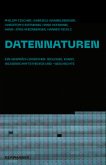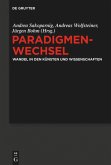Computer-based technologies for the production and analysis of data have been an integral part of biological research since the 1990s at the latest. This not only applies to genomics and its offshoots but also to less conspicuous subsections such as ecology. But little consideration has been given to how this has changed research practically. How and when do data become questionable? To what extent does the necessary infrastructure influence the research process? What status is given to software and algorithms in the production and analysis of data?
These questions were discussed for two days in September 2016 by the biologists Philipp Fischer und Hans Hofmann, the philosopher Gabriele Gramelsberger, the historian of science and biology Hans-Jörg Rheinberger, the science theorist Christoph Hoffmann, and the artist Hannes Rickli. The conditions of experimentation in the digital sphere are examined in four chapters-"Data," "Software," "Infrastructure," and "in silico"-in which the different perspectives of the discussion partners complement one another. The aim is not to confirm one's own point of view, but through reciprocal interchange to gain a deepened understanding of the contemporary basis of biological research.
Hinweis: Dieser Artikel kann nur an eine deutsche Lieferadresse ausgeliefert werden.
These questions were discussed for two days in September 2016 by the biologists Philipp Fischer und Hans Hofmann, the philosopher Gabriele Gramelsberger, the historian of science and biology Hans-Jörg Rheinberger, the science theorist Christoph Hoffmann, and the artist Hannes Rickli. The conditions of experimentation in the digital sphere are examined in four chapters-"Data," "Software," "Infrastructure," and "in silico"-in which the different perspectives of the discussion partners complement one another. The aim is not to confirm one's own point of view, but through reciprocal interchange to gain a deepened understanding of the contemporary basis of biological research.
Hinweis: Dieser Artikel kann nur an eine deutsche Lieferadresse ausgeliefert werden.








